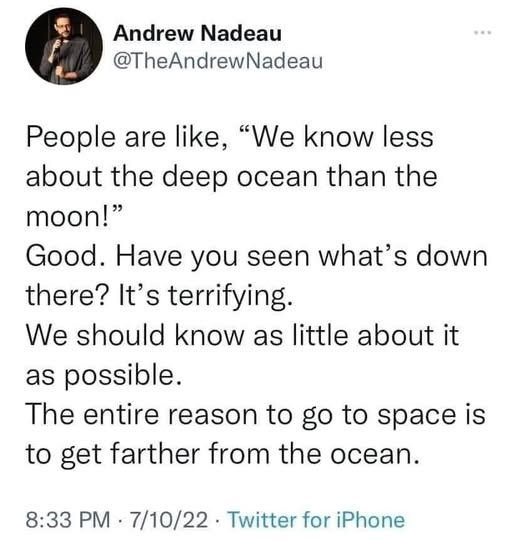this post was submitted on 08 Apr 2025
1493 points (98.3% liked)
Science Memes
14807 readers
2798 users here now
Welcome to c/science_memes @ Mander.xyz!
A place for majestic STEMLORD peacocking, as well as memes about the realities of working in a lab.

Rules
- Don't throw mud. Behave like an intellectual and remember the human.
- Keep it rooted (on topic).
- No spam.
- Infographics welcome, get schooled.
This is a science community. We use the Dawkins definition of meme.
Research Committee
Other Mander Communities
Science and Research
Biology and Life Sciences
- [email protected]
- [email protected]
- [email protected]
- [email protected]
- [email protected]
- [email protected]
- [email protected]
- [email protected]
- [email protected]
- [email protected]
- [email protected]
- [email protected]
- [email protected]
- [email protected]
- [email protected]
- [email protected]
- [email protected]
- [email protected]
- [email protected]
- [email protected]
- [email protected]
- [email protected]
- [email protected]
- [email protected]
- !reptiles and [email protected]
Physical Sciences
- [email protected]
- [email protected]
- [email protected]
- [email protected]
- [email protected]
- [email protected]
- [email protected]
- [email protected]
- [email protected]
Humanities and Social Sciences
Practical and Applied Sciences
- !exercise-and [email protected]
- [email protected]
- !self [email protected]
- [email protected]
- [email protected]
- [email protected]
Memes
Miscellaneous
founded 2 years ago
MODERATORS
you are viewing a single comment's thread
view the rest of the comments
view the rest of the comments

I had to look it up out of curiosity. The rib cage and lungs of sperm whales are adapted to collapse under pressure, squeezing all the air in the lungs into a small space and increasing internal cavity pressure.
https://manoa.hawaii.edu/exploringourfluidearth/physical/ocean-depths/pressure/compare-contrast-connect-deep-divers
I think that also happens to humans, but without being adapted to it, it's a one way squeeze.
Like a tube of toothpaste
Not as minty
Depends what you eat.
Wait, why didn't they get the bends?
They know to ascend slowly to avoid it, but it can absolutely happen.
https://www.whoi.edu/press-room/news-release/how-do-marine-mammals-avoid-getting-the-bends/
Ty!
They can if they do too many dives in rapid succession.
You get the bends by having a lot of nitrogen dissolved on your bloodstream due to the pressure. So it's a function of how much nitrogen you breathe, how much pressure you're breathing it at, and the total amount of blood (and some other tissues) in your body that can absorb that nitrogen. Divers get the bends because they are taking multiple breaths of air under pressure, there is multiple lung volumes of nitrogen cycling though the diver. Whales and other diving animals don't typically "hold" their breath when they dive, but if they did, it would only be 1 breath of air for the entire dive. Air in the lungs is bouyancy they don't want and can potentially injure them when it re-expands. Most marine diving animals will saturate their blood and muscles with oxygen at the surface and then dive and exhale.